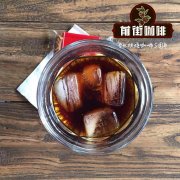South American Coffee | characteristics of Bolivian Coffee producing areas description of Bolivian coffee flavor

Bolivia is a South American country, with Peru and Chile in the interior, Brazil in the west and Argentina / Paraguay in the south.
Growth altitude: 1400-1600 m
Coffee varieties: iron pickup, Kaddura, Kaduai
Treatment process: washing, insolation
Aroma: herbs, dark chocolate
Taste: fruit, caramel, pepper, vanilla
Alcohol thickness: good
Acidity: mild citric acid, phosphoric acid
Bolivia produces coffee at very high elevations above 1400 m, which makes most of its coffee meet the strict requirements of cultivation (1450 m +). Peru, Brazil, Argentina and Chila are surrounded by parts of the Andes. Quinoa has become a famous crop in Bolivia in recent years.
Most of the coffee grown is iron pickup, Kaddura and some Kaduai. Major coffee growing areas include Yungas, Santa Cruz, Cochabamba, Tariha, Beni and Pando, of which more than 90% of coffee production comes from Yungas.
Description of Bolivian coffee flavor
Bolivian coffee is famous for its classic and clean taste, its delicate, bright acidity and sweet, aromatic quality, with fruit aromas of apple, pear, orange, lemon and apricot. Caramel and mild chocolate flavors may occur during coffee roasting.
Bolivian coffee plant varieties
Although there are some Kaddura plants (Coffea arabica var. Caturra), but most of the coffee plants grown in Bolivia are iron pickups.
Small coffee farms lack adequate fertilizers and minerals to support the optimal growth of coffee trees and beans, leading to reduced crop yields in recent years. The lack of infrastructure also means it is difficult for Bolivia to export to other countries, but importers of raw coffee from the United States and Canada provide Bolivia from time to time.
Distributors and brokers are continuing their efforts to develop Bolivia's wholesale coffee trade, which should see good growth in the next few years.
Important Notice :
前街咖啡 FrontStreet Coffee has moved to new addredd:
FrontStreet Coffee Address: 315,Donghua East Road,GuangZhou
Tel:020 38364473
- Prev

Introduction to the characteristics of Dominica Coffee producing area description of Dominican Coffee Flavor
The Dominican Republic produces a variety of specialty coffee. These coffees are usually sold under the name Santo Domingo Coffee and are famous for their fullness, moderate to medium acidity, strong aroma and earthy tones. Dominican coffee is characterized by high-growth Dominica coffee with higher acidity than under-grown coffee, which tends to be softer. In fact, Dominica
- Next

South American Coffee | introduction to coffee producing areas and coffee grading systems in Trinidad and Tobago
Coffee is grown on estates and small farmers in the hilly areas of Trinidad and Tobago. The number of the industry has declined in recent years due to coffee diseases and pests, inefficient farming practices and uncertain economic conditions. The Republic of Trinidad and Tobago is located in the southern Caribbean south of Grenada, adjacent to the north-east coast of Venezuela. Coffee from Trinidad and Tobago in 1985
Related
- Detailed explanation of Jadeite planting Land in Panamanian Jadeite Manor introduction to the grading system of Jadeite competitive bidding, Red bid, Green bid and Rose Summer
- Story of Coffee planting in Brenka region of Costa Rica Stonehenge Manor anaerobic heavy honey treatment of flavor mouth
- What's on the barrel of Blue Mountain Coffee beans?
- Can American coffee also pull flowers? How to use hot American style to pull out a good-looking pattern?
- Can you make a cold extract with coffee beans? What is the right proportion for cold-extracted coffee formula?
- Indonesian PWN Gold Mandrine Coffee Origin Features Flavor How to Chong? Mandolin coffee is American.
- A brief introduction to the flavor characteristics of Brazilian yellow bourbon coffee beans
- What is the effect of different water quality on the flavor of cold-extracted coffee? What kind of water is best for brewing coffee?
- Why do you think of Rose Summer whenever you mention Panamanian coffee?
- Introduction to the characteristics of authentic blue mountain coffee bean producing areas? What is the CIB Coffee Authority in Jamaica?

